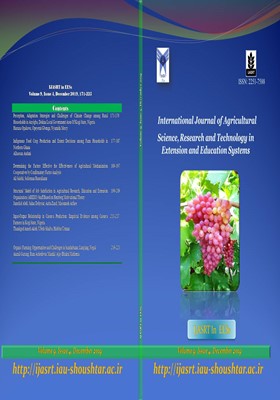Perception, Adaptation Strategies and Challenges of Climate Change among Rural Households in Anyigba, Dekina Local Government Area Of Kogi State, Nigeria
محورهای موضوعی : Extension PlanningHaruna Opaluwa 1 , Opeyemi Gbenga 2 , Nyamida Mercy 3
1 - Department of Agricultural Economics and Extension, Faculty of Agriculture, Kogi State University Anyigba, P.M.B 1008, Anyigba, Kogi State, Nigeria
2 - Department of Agricultural Economics and Extension, Faculty of Agriculture, Kogi State University Anyigba, P.M.B 1008, Anyigba, Kogi State, Nigeria
3 - Department of Agricultural Economics and Extension, Faculty of Agriculture, Kogi State University Anyigba, P.M.B 1008, Anyigba, Kogi State, Nigeria
کلید واژه: Rural Households, Perception, Adaptation Strategies,
چکیده مقاله :
Climate change is one of the most serious challenges confronting agriculture, particularly, in rural Nigeria. This study examined the perception, adaptation strategies and challenges of climate change among rural households in Kogi State, Nigeria. A two stage sampling techniques was used in the study. The first stage involves the purposive selection of six (6) rural farming communities, followed by a random selection of twenty (20) farmers each from the communities making a total of 120 respondents, the data were elicited with the aid of a structured questionnaire. The data were analyzed using descriptive statistics such as frequency counts, percentages, percentages, mean distribution and ranking. Most farmers observed change in climate, on their perception of climate change, the result showed that majority (44.9%) perceived climate change not to be severe, 41.5% perceived climate change to be very severe while 13.6% were undecided. On the perceived effects, most (87.5%) agreed to prevalence of pest and diseases, followed by high temperature (85.5%) as the major consequence of climate change in the area. Pesticide application (81.7%) was the major adaptive strategy used in the study area. Mulching (66.7%) is also very common in the area. Lack of government support (88.3%), inadequate extension services (86.7%), lack of finance (83.3%) among others were the main constraints to adaptation adoption in the study area. The study concluded that the respondents were aware and knowledgeable on the issues of climate change. There is need for government to make concrete efforts to enact appropriate policies on climate change adaptation.
10. Maharajan, S.K., Sigdel, E.R., Sthapit, B.R. and Regmi, B.R. (2011).Tharu Community’s Perception on Climate changes and their adaptive Initiations to withstand its Impacts in Western Tarai of Nepal. International NGO journal, (2): 35-42
11. Mamman, B.Y., Wudi, A. H l. and Halliru, M. (2014). Socioeconomic Factors and Income Diversification Affecting Food Security Status of Farming Households in Jigawa State, Nigeria. Proceedings of the 1st International Conference on Drylands by the Centre for Dryland Agriculture, Bayero University, Kano,
12. Montel, B. P. and Teweldemedhin, M.Y. (2014). Assessment of farmers’ perceptions and the economic impact of climate change in Namibia: case study on small-scale irrigation farmers (SSIFs) of Ndonga Linena irrigation project. Journal of Development and Agricultural Economics vol.6 (11).pp. 443.454
13. Montel, B.P. and Teweldemedhin, M.Y. (2014). Assessment of farmers’ perceptions and the economic impact of climate change in Namibia: case study on small-scale irrigation farmers (SSIFs) of Ndonga Linena irrigation project. Journal of Development and Agricultural Economics vol.6 (11).pp. 443.454
14. Nhemachena, C. (2009). Agriculture and future climate dynamics in Africa: impacts and adaptation options. Ph.D. Thesis presented to Department of Agricultural Economics, Extension, and Rural Development, University of Pretoria. P. 150.
15. Nwalieji H. U. andOnwubuya E. A. (2012). Adaptation Practices to Climate Change Among Rice Farmers inAnambra State of Nigeria, Journal of Agricultural Extension Vol. 16 (1), pp. 31-40
16. Odjugo, P.A.O. (2010). Adaptation to climate change in the agricultural sector in the semi-arid region of Nigeria. 2nd International Conference: Climate, Sustainability and Development in Semi-arid regions, Fortaleza-ceara, Brazil,
17. Okpe, B.E. and Aye, G.C. (2015). Adaptation to Climate Change by Farmers in Makurdi, Nigeria Journal of Agriculture and Ecology Research International 2(1):46-57.www.sciencedomain.org
18. Opaluwa, Haruna I., Otitoliaye, Justin, O and Ibitoye Stephen, J.(2014).Technical Efficiency Measurement among Maize Farmers in Kogi State, Nigeria. Journal of Biology, Agriculture and Healthcare, 4(25): 240-246.
19. Opaluwa, H.I., Oyibo, F.O., and Jimoh, F.A. (2018).Determinants of Food Security among Farming Households in Akure North Local Government Area of Ondo State, Nigeria.J. Asian Rur. Stud. 2(2):168-176
20. Oyiga B.C., Mekbib H., & Christine .W. (2011).Implication of climate change on crop yield & Food Accessibility in Sub-Saharan Africa, Center for Development Research, University of Bonn.P 3-31
21. Ozor, N. and Nnaji, C. (2010).Difficulties in adaptation to Climate Change by Farmers in Enugu State, Nigeria. Journal of Agricultural Extension, 14(2): 106-122.
22. Rosenzweig, C. and Parry M.L. (1994). Potential impact of climate change on world food supply. Nature, 367:133–138;


